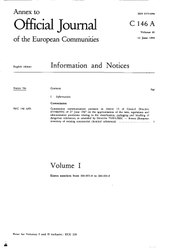European Community number
The European Community number (EC number) is a unique seven-digit identifier that was assigned to substances for regulatory purposes within the European Union by the European Commission. The EC Inventory comprises three individual inventories, EINECS, ELINCS and the NLP list.[1]

Structure
[edit]The EC number may be written in a general form as: NNN-NNN-R,[2] where the N represents digits and R is a check digit. The check digit is calculated using the ISBN method. According to this method, the check digit R is the following sum modulo 11:
If the remainder R is equal to 10, that combination of digits is not used for an EC number. To illustrate, the EC number of dexamethasone is 200-003-9. N1 is 2, N2 through N5 are 0, and N6 is 3.
The remainder is 9, which is the check digit.
There is a set of 181 ELINCS numbers (EC numbers starting with 4) for which the checksum by the above algorithm is 10 and the number has not been skipped but issued with a checksum of 1.
EC Inventory
[edit]The EC Inventory includes the substances in the following inventories. The content of these inventories is fixed and official.
| Inventory | Scope | Format | Number of entries (if fixed number of entries) |
|---|---|---|---|
| European Inventory of Existing Commercial Chemical Substances (EINECS) | Substances, excluding polymers, that were recorded as being commercially available in the EU from 1 January 1971 to 18 September 1981.[3] These were considered registered under Article 8(1) of the Dangerous Substances Directive (67/548/EEC). They are considered phase-in substances under the REACH Regulation. | 2xx-xxx-x 3xx-xxx-x |
100,102[3] |
| European List of Notified Chemical Substances (ELINCS) | Substances notified under the Dangerous Substances Directive Notification of New Substances (NONS) that became commercially available after 18 September 1981.[citation needed] | 4xx-xxx-x | 4,381 |
| No Longer Polymers (NLP) | The definition of polymers was changed in April, 1992[4] with the result that substances previously considered to be polymers were no longer regarded as polymers. Consequently, a list, called the NLP-list (No Longer Polymer), was made of such substances that were not covered by the polymer definition but were placed on the market between after 18 September 1981 and 31 October 1993.[5] | 5xx-xxx-x | 703 |
List numbers
[edit]European Chemicals Agency (ECHA) also applies the EC number format to what it calls "List number".[6] The number are assigned under the REACH Regulation without being legally recognised. Hence, they are not official because they have not been published in the Official Journal of the European Union. List numbers are administrative tools only and shall not be used for any official purposes.
| Scope | Format |
|---|---|
| Automatically assigned, e.g. to pre-registrations of substances with a CAS No. | 6xx-xxx-x |
| Assigned to substances after inquiries by the ECHA Substance ID Team | 7xx-xxx-x |
| Automatically assigned to substances identified only with a CAS No. (continuation of the 6xx-xxx-x series) | 8xx-xxx-x |
| Automatically assigned, e.g. to pre-registrations without a CAS No. or other numerical identifier (including reaction masses of more than one substance) | 9xx-xxx-x |
See also
[edit]- Registration, Evaluation, Authorisation and Restriction of Chemicals
- European chemical Substances Information System
- CAS registry number
References
[edit]- ^ "Guidance for identification and naming of substances under REACH and CLP" (PDF). European Chemicals Agency. May 2017. p. 106. Archived from the original (PDF) on 2017-08-28. Retrieved 2017-08-28.
- ^ "Commission Directive 2001/59/EC of 6 August 2001 adapting to technical progress for the 28th time Council Directive 67/548/EEC on the approximation of the laws, regulations and administrative provisions relating to the classification, packaging and labelling of dangerous substances" (pdf). Official Journal of the European Communities (L 225). European Commission: 4. 21 August 2001. Retrieved 2011-12-18.
- ^ a b Geiss, F.; Del Bino, G.; Blech, G.; Nørager, O.; Orthmann, E.; Mosselmans, G.; Powell, J.; Roy, R.; Smyrniotis, T.; Town, W. G. (1992). "The EINECS inventory of existing chemical substances on the EC market". Toxicological & Environmental Chemistry. 37 (1–2): 21–33. doi:10.1080/02772249209357850.
- ^ "Council Directive 92/32/EEC of 30 April 1992 amending for the seventh time Directive 67/548/EEC on the approximation of the laws, regulations and administrative provisions relating to the classification, packaging and labelling of dangerous substances" (pdf). Official Journal of the European Communities (L 154). European Commission: 1–29. 30 April 1992. Retrieved 2009-01-25.
- ^ "Regulation (EC) No 1272/2008 of the European Parliament and of the Council of 16 December 2008 on classification, labeling and packaging of substances and mixtures, amending and repealing Directives 67/548/EEC and 1999/45/EC, and amending Regulation (EC) No 1907/2006" (pdf). Official Journal of the European Communities (L 353). European Commission: 329. December 31, 2008. Retrieved 2009-01-24.
- ^ Registered substances Archived 2011-12-05 at the Wayback Machine at European Chemicals Agency (ECHA)
External links
[edit] EC number (P232) (see uses)
EC number (P232) (see uses)


